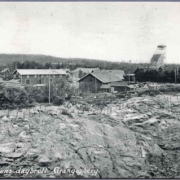Archive for year: 2023
Guillaume Tremblay-Boily writes on “Deindustrialization’s social impact” on IRIS’s blog
/in Uncategorized/by Communications“Aux champs, à l’atelier et à la mine. Expériences du travail hors de l’usine, entre mondes ruraux et urbains (XIXe-XXIe siècles)” co-edited by Pascal Raggi
/in Publications/by CommunicationsCongratulations to Lauren Laframboise for her Concordia Stand-Out Graduate Research Award
/in Uncategorized/by CommunicationsJoin us for DePOT’s next roundtable: The Political Economy of Deindustrialization
/in Uncategorized/by CommunicationsWelcome to our new partners: Dr Sherry Lee Linkon and Georgetown University
/in Uncategorized/by CommunicationsSpatial politics of capital: Deindustrialization and gentrification in Montreal’s Mile End
/in Blog/by CommunicationsHistoire d’avant, pendant et après les fermetures de six usines au Québec
/in Blog, Uncategorized/by CommunicationsJournée d’étude on new perspectives in the history of labour, social movements and capitalism at UQAM
/in Uncategorized/by CommunicationsCall for Papers: Gender, Family and Deindustrialization (June 25-26, 2024)
/in Conferences/by CommunicationsEntrenching extractivism: Noxious deindustrialisation in sacrifice zones, a Chilean case
/in Blog, Uncategorized/by CommunicationsEverything, Everywhere, All at Once: The Oil Crises of the 1970s and the Transformation of the Postwar World
/in Conferences/by CommunicationsWorking-Class Knowledge(s) in the Academy: Theory, Practice and Method is looking for chapters from potential contributors!
/in Uncategorized/by Communications“The Politics of Deindustrialization in Canada”, a DePOT initiative for Active History
/in Uncategorized/by CommunicationsCall for Papers: Industrial Heritage, Social Issues, and Challenges for a New Governance
/in Discovery/by CommunicationsNo More Scheffervilles
/in Blog/by CommunicationsForty years ago this summer, the Cleveland-based Iron Ore Company of Canada closed its open pit mine in Quebec’s far northeast, putting the future of the town of Schefferville into doubt. Most of the housing in the town of 2,500 was owned by the departing company as was the long railway line south to Sept-Iles, the only land-link to the outside world. While most industrial closures receive little public attention outside of the immediate locality or region, Schefferville became front page news across Canada for weeks, even years. What explains this sustained interest?
Piyusha Chatterjee to start Gender, Family, and Deindustrialization Postdoc at the University of Glasgow
/in Partnership/by CommunicationsReindustrialization in the Wake of Deindustrialization: The Past and the Future in Two Swedish Regions
/in Blog, Outcomes/by CommunicationsSalaried Staff, Engineers and Middle Managers: Are they the neglected workers of deindustrialization’s historians?
/in Blog, Uncategorized/by Communications

Social
Members
Newsletter
Archive
- November 2024
- October 2024
- September 2024
- August 2024
- July 2024
- June 2024
- May 2024
- April 2024
- February 2024
- January 2024
- December 2023
- November 2023
- October 2023
- September 2023
- August 2023
- July 2023
- June 2023
- May 2023
- April 2023
- March 2023
- February 2023
- January 2023
- December 2022
- November 2022
- October 2022
- September 2022
- July 2022
- June 2022
- May 2022
- April 2022
- March 2022
- January 2022
- December 2021
- November 2021
- October 2021
- September 2021
- August 2021
- July 2021
- June 2021
- May 2021
- April 2021
- March 2021







 Photo: Alusuisse workers meet in Steg, January 1993 (Schweizer Fernsehen DRS, 27.1.1993
Photo: Alusuisse workers meet in Steg, January 1993 (Schweizer Fernsehen DRS, 27.1.1993






 Tosh Warwick
Tosh Warwick

 Kassandra Spooner Lockyer
Kassandra Spooner Lockyer

 Francisco Rivera
Francisco Rivera Bouchecl, Wikimédia, Creative Commons Attribution-Share Alike license
Bouchecl, Wikimédia, Creative Commons Attribution-Share Alike license Tatiana Gomez
Tatiana Gomez



 Photo: Jules Lister
Photo: Jules Lister





 Source: Store Norske Leksikon
Source: Store Norske Leksikon Tenby, South Wales. Wikicommons. Used under a Creative Commons Attribution-Share Alike 4.0 International license.
Tenby, South Wales. Wikicommons. Used under a Creative Commons Attribution-Share Alike 4.0 International license. 


